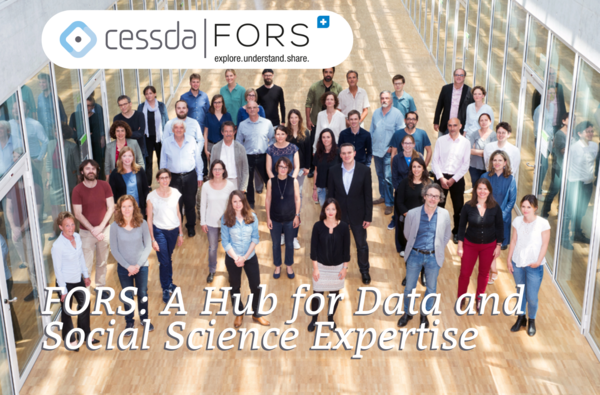
Get to know FORS: A Hub for Data and Social Science Expertise
FORS, the Swiss Centre of Expertise in the Social Sciences, is widely recognized as Switzerland’s go-to institution for social science data and expertise. But FORS is more than a data archive: it is a hub that connects researchers, datasets, methodologies, and services, creating a vibrant platform for collaboration, exchange, and innovation. By combining research, training, and methodological support, FORS ensures that Swiss social science stays cutting-edge, well-connected, and responsive to evolving needs.
At the core of FORS’s activities are its large-scale surveys, which provide rich longitudinal and cross-sectional data. Key projects include the Swiss Household Panel (SHP), Selects, and MOSAiCH, all designed to track social trends over time. Beyond its own surveys, FORS supports other research groups with data collection, offering expert guidance and infrastructure. It also represents Switzerland in major international survey programmes, including the European Social Survey (ESS), European Values Study (EVS), and Survey of Health, Ageing and Retirement in Europe (SHARE), integrating Swiss social science into global research networks.
FORS’s impact extends well beyond data collection. Researchers at FORS collaborate closely with colleagues across Switzerland and abroad, producing studies on a wide range of topics using innovative methods. Recent publications highlight this diversity. Marieke Heers and colleagues (2025) analyse the impact of tracking in the Swiss educational system on students’ aspirations, highlighting differences between migrant and native families. Christina Bornatici and her co-author Isabelle Zinn (2025) examine how gender ideology shapes employment and family arrangements in Swiss couples. Oliver Lipps, Lukas Lauener and Anke Tresch (2025) analyse panel consent rates and compare consenters with non-consenters against a comprehensive set of socio-demographic characteristics, political attitudes, and survey-related variables in a probability-based web survey, showing FORS’s role in advancing survey methods. Together, these studies demonstrate that FORS researchers address both substantive social science questions and methodological innovation.
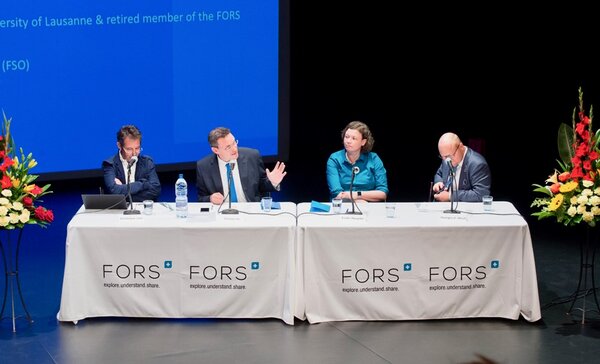
From the 10th anniversary of FORS in 2018. From left to right: Prof Dominique Joye (retired Professor at UNIL), Prof. Dr. Georg Lutz (Present FORS Director), Prof. Dr. Eszter Hargittai (Prof. at UNIZH) and Prof. Dr Georges-Simon Ulrich, Director of the Federal Statistical Office.
As part of its international activities, FORS is an active member of the CESSDA community and has collaborated over the years on many key projects and working groups. Currently, FORS staff members serve as chairs of the Data citation working group, the Sensitive data working group, and the AI task force. FORS is also service owner of the European Question Bank (EQB)."
Central to FORS’s hub function is its expertise in data collection and management, which it shares widely through publications, trainings, and hands-on support. The FORS Guides series provides practical guidance on social science data practices, complemented by the FORS-DaSCH Data Management Webinar Series and the Swiss Summer School in Social Science Methods. Researchers can also benefit from individual consultations, Data Live sessions, and close collaboration with data stewards through initiatives such as the Certificate of Advanced Studies (CAS) in Data Stewardship and the Swiss Research Data Support Network. These activities equip researchers with essential skills and foster a strong, connected community around best practices in social science research.
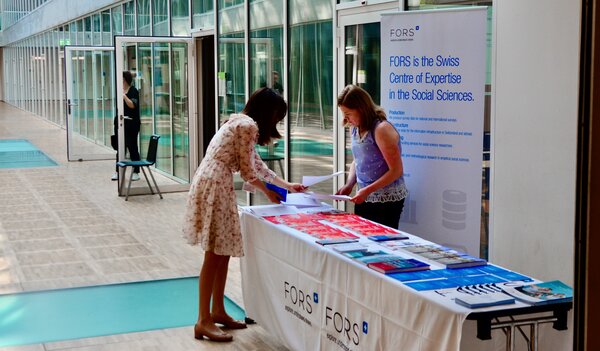
Dr. Marieke Heers behind our desk during a conference.
The building is the Geopolis building, where the FORS offices are located.
Another pillar of FORS’s hub function is SWISSUbase, the in-house platform for depositing and accessing social science datasets. Researchers can upload, manage, and obtain data in a secure and user-friendly environment. Feedback from participants in a 2025 survey on data reuse shows the positive impact of FORS and SWISSUbase. Many praised both the platform and the people behind it: “Great platform and great people working there,” and “I would like to thank you for the good job you do.” Others highlighted its practical value: “SWISSUbase is an excellent resource for researchers,” “Thank you for providing a wide range of data. This helps future research,” and “I like that the data are available for free.” These reflections illustrate that FORS not only provides essential tools but also fosters a supportive and collaborative research community.
In September, the Faculty of Social and Political Sciences (SSP) at the University of Lausanne and FORS, through their joint research platform DReMSS, launched a new series of academic exchanges: the DReMSS Sessions. This series of webinars, survey surgeries, and expert workshops, jointly organized with the SSP, provides a space for discussion, networking, and exchange of best practices. The sessions bring together researchers to share cutting-edge methodological developments, tackle survey and data analysis challenges, and learn from leading experts in the field.
FORS is also active in the broader scientific community, participating in and organizing conferences, giving Swiss social science researchers opportunities to present their work and connect with colleagues. Memberships in associations such as the Swiss Society for Research in Education further strengthen FORS’s collaborative network, fostering knowledge exchange and professional development.
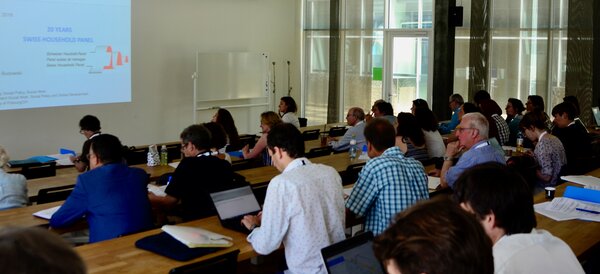
Researchers from FORS and the University of Lausanne inside the Geopolis building during a conference celebrating 20 years of FORS' Swiss Household Panel survey: https://forscenter.ch/projects/swiss-household-panel/
The impact of FORS as a hub is multifaceted. By providing access to high-quality data, methodological guidance, training opportunities, and SWISSUbase, FORS enables researchers to conduct robust and innovative social science research. It strengthens collaborations, offers training, and shares expertise across the community.
Looking ahead, FORS will continue to expand its role as a central hub for social science research. Initiatives such as Data Live, ongoing collaborations with researchers and data stewards, and active engagement with the Swiss social science community demonstrate its commitment to connecting people, data, and expertise. Future plans include expanding training opportunities, increasing support for early-career researchers, and publishing additional methodological and data management guides to reflect emerging trends in social science research. FORS’s activities not only support current projects but also prepare the next generation of social scientists to conduct rigorous, data-driven studies.
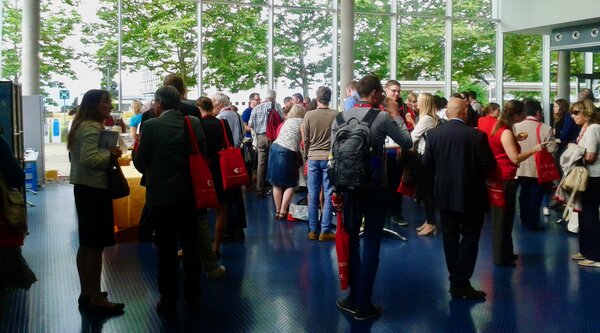
From the ESS conference in 2016 that Switzerland hosted.
As Switzerland’s reference point and hub for social science expertise, FORS invites researchers, students, and institutions to engage with its services, take part in training opportunities, and contribute to its collaborative projects. By combining high-quality data, methodological know-how, and an extensive network of researchers, FORS ensures that social science in Switzerland continues to thrive, innovate, and inform national and international discussions.
Recent feedback on FORS and SWISSUbase has been very positive, with one researcher saying saying its a “Great platform and great people working there”. Several levy thanks to the people working at FORS for the work they do, with one saying “Thank you for providing a wide range of data. This helps future research.”
These reflections show how FORS not only provides essential tools but also fosters a supportive, collaborative, and accessible research community.
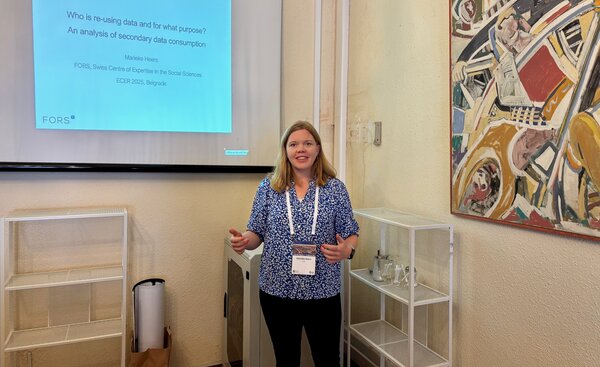
Marieke Heers giving a presentation on "Who is reusing data and for what purpose? An analysis of secondary data consumption."
Want to find out more about FORS? Chech out these resources:
Data Live sessions: Explore FORS’s interactive sessions on data management and research: https://forscenter.ch/data-live/
Swiss Summer School in Social Science Methods (SSM): Advanced training in social science methods and data management: https://www.usi.ch/en/formazione/apprendimento-permanente/summer-winter-school/ssm/advanced-skills-research-data-management-fall
Certificate of Advanced Studies (CAS) in Data Stewardship: Learn more about data stewardship training: https://wp.unil.ch/swissds-env/
Swiss Research Data Support Network (SRDSN): Support and collaboration for research data management: https://www.researchdatasupport.ch/
Gomensoro, A., Heers, M., Kamm, C., & Hupka-Brunner, S. (2025). The impact of tracking in a stratified educational system on idealistic educational aspirations in migrant and native families. Research in Social Stratification and Mobility, 97, 101022. https://doi.org/10.1016/j.rssm.2025.101022
Bornatici, C., & Zinn, I. (2025). Beyond tradition? How gender ideology impacts employment and family arrangements in Swiss couples. Gender & Society, 39(3), 285–320. https://doi.org/10.1177/08912432251317464
Lipps, O., Lauener, L., & Tresch, A. (2025). Asking for Panel Consent in Web Surveys: Choice, Opt-in, or Opt-out?. Survey Research Methods, 19(1), 43–53. https://doi.org/10.18148/srm/2025.v19i1.8366
*Article co-authored by AI*